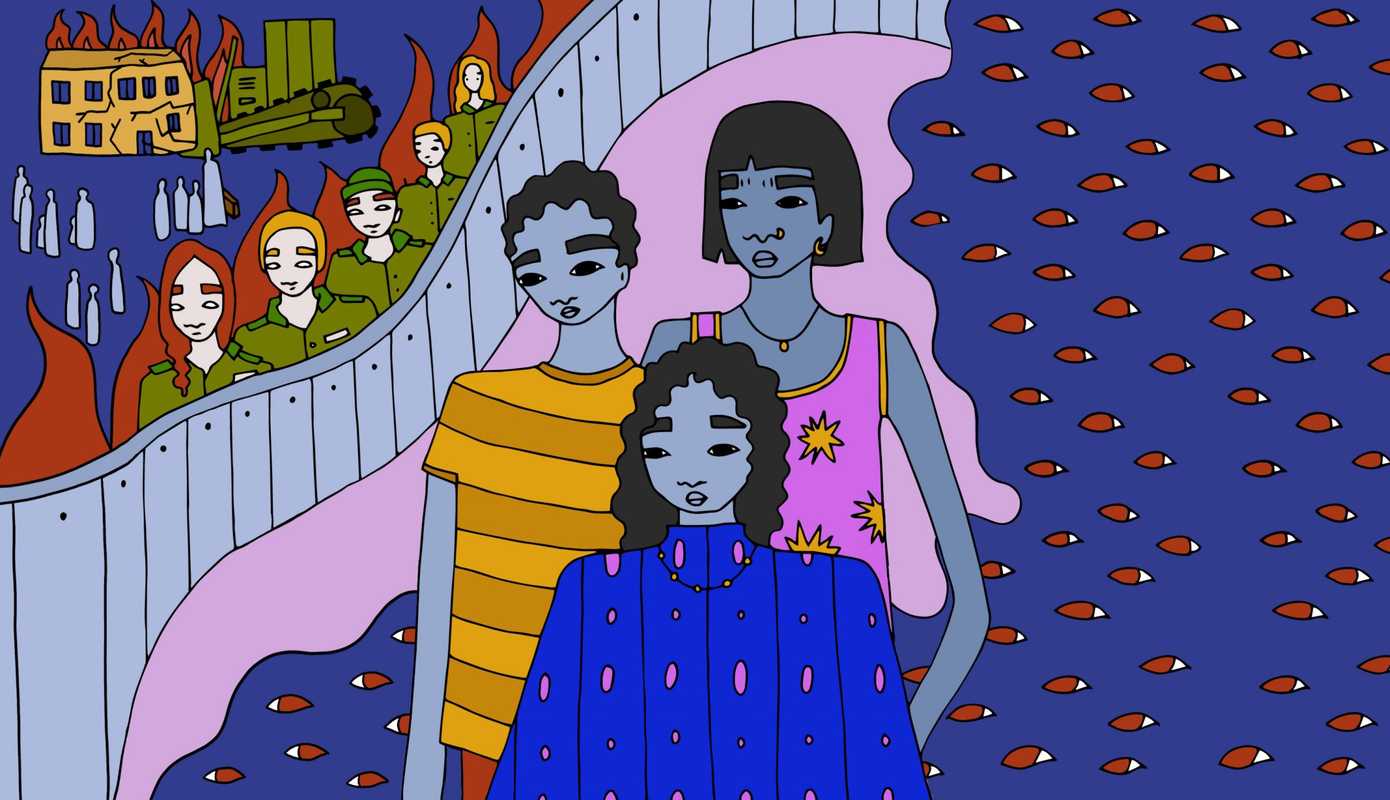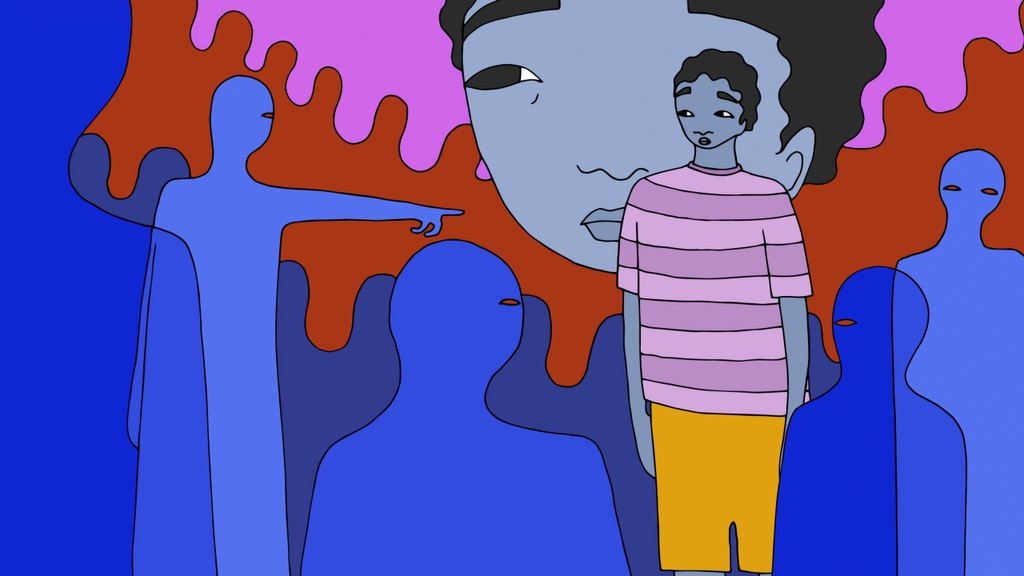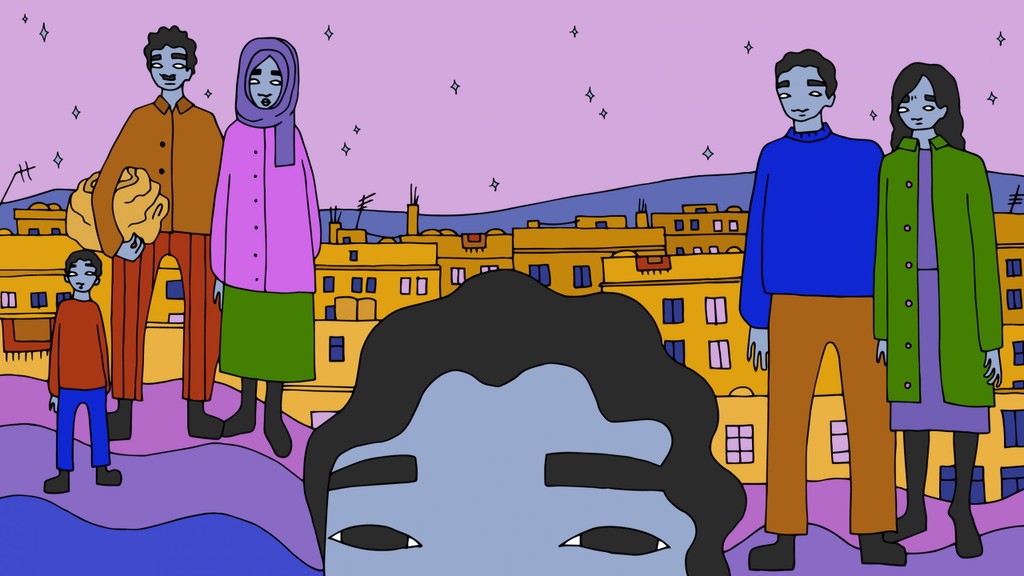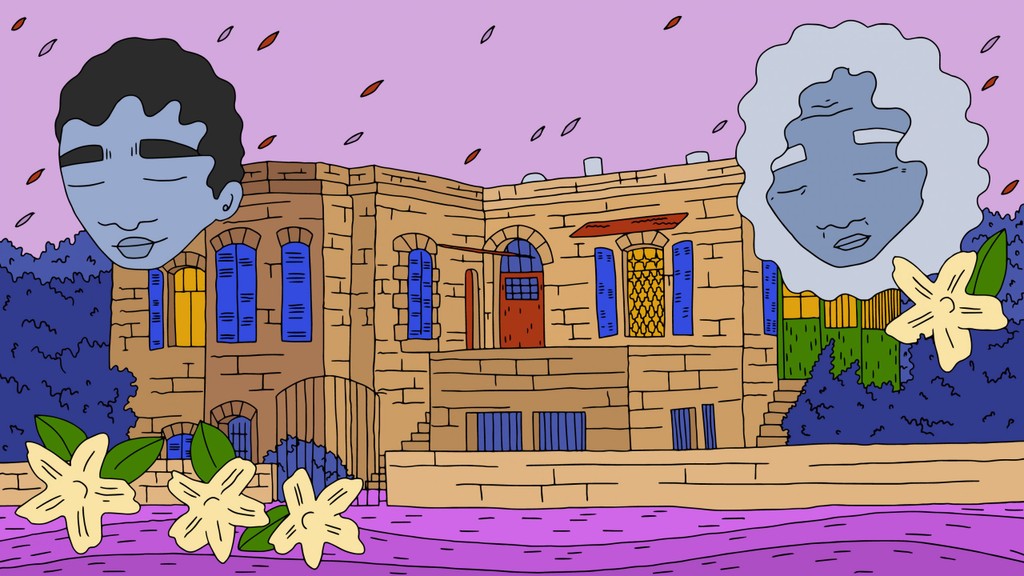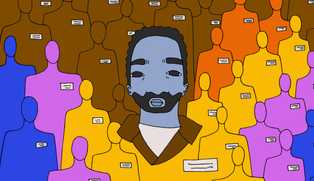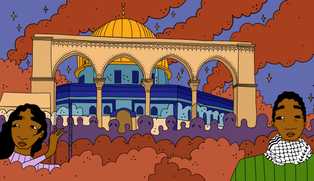This article is part of PALESTINE: WAYS OF BEING, a season centring under-explored areas of Palestinian life and liberation.
*
Content note: This article contains a description of verbal assault and a homophobic slur.
*
I am five or six years old in our stone house in al-Weibdeh, on the seam between East and West Amman, where we landed after fleeing. I am standing outside Tata’s bedroom door, under the drawing of a grandmother sitting on her rocking chair, knitting a sweater. A black cat is curled on the grandmother’s lap. If your mother says no, the caption reads, ask your grandmother.
Tata is doused in the sunlight seeping through the window above her bed, her hair a brilliant white in its rays. She is curled on her side like a foetus, facing the door. She has fallen asleep on top of the brown covers, her burgundy shawl spread over her floral nightgown. Having lost all of her possessions too many times, she holds onto these items more than thirty years later.
The house is dead quiet. Mama and Baba are reading in their room down the hall. Tata is only half asleep, attentive to the sounds around her.
I’m just resting my eyes, she would say, her eyelids shut. I’m not sleeping. Just in case, not wanting to wake her, my toes land noiselessly on the bare floor. Her room is sparsely furnished – as if she has no need for worldly goods – with a cupboard and a chest of drawers that has three picture frames on it. One is of Mama and Baba on their wedding day. The other is of Khalo, Mama’s only brother, with his Brazilian ex-wife. The third is of Tata holding Wael, her first grandchild, when he was just a baby, before Raed and I were born. She looks fashionable in the photograph, standing proudly in a polka dot dress and large sunglasses. On the bedside table is her bible: black, leather-bound with golden Arabic letters sewn across its cover. The mattress sags under my weight as I climb on, snuggling into the space between her back and the wall.
Habibi, she murmurs, you’ve come to take a nap with me?
What bliss. Safely tucked behind her, the knots in my stomach from school loosen. The sheets, toasty, warm my back. My eyes wander to branches heavy with figs reaching towards the window, then up to the shiny wooden crucifix above our heads. The taut muscles of the Jesus figure. The carved detail of his thorny crown. The burnt wood around his wounds.
The crucifix is one of the few items to have lived alongside Tata her entire life, watching over her as she slept. To this day, its journey from Jerusalem, how it came to hang in our home in Amman, remains only partially recounted. Snippets here and there, like clues dropped over the course of a childhood and beyond.
*
Bayn layla wa duha-ha, as Mama says. Between night and dawn, the school yard that had once enticed me became a confusing place. A menacing one. Nowhere more so than by the blue railings that snaked along three flights of stairs from our classrooms down to the main courtyard, just past the Jordanian flag where every morning we lined up to sing the national anthem and pledge our loyalty to the monarch.
The transformation may not have been sudden. The looks I encountered one day may have been there all along, unseen. Nevertheless, one morning, the faces of boys and girls around me became mocking. Eyes filled with disgust. Lips pursed a bit too tightly. Mouth corners overturned ever so slightly. Kind eyes looked away.
Although I had hardly noticed the blue on the railings before, one morning my gaze shifted to the paint. It was patchy, with rusted metal peeking out from underneath. My fingers traced the chipped paint, finding blotches where workmen had left uneven layers I could spend some time trying to peel.
Fadi Aseel was his name. My eyes avoided his. A straight line of vision is usually what bade him over. Our eyes locking was an invitation. The physical collision into me, if there ever was one, was barely perceptible and hardly memorable compared to the jolt inside me. The searing realisation ripped through my body that I was on the cusp of another humiliation.
My stomach still clenches recalling those moments, even two decades and a continent removed. My shoulders tighten and a flash of heat makes me sweat, as if Amman’s sun rather than London’s grey sky is peering through my window. My mouth dries as I stand, surrounded by boys, looking into his black eyes, imploring him to move on – or at least to find another corner to carry out this charade, a corner less exposed, where my brothers would not be able to see. Despite my height, he towers over me, pretending that I had rammed into him with my shoulder.
“I’ll fuck you and your sister if you push into me again. Next time you see me pass, you stop and get out of the way. Do you understand me, faggot?”
My chest clenches and I begin shaking. I try to nod, but my body seems separate from me, unable or unwilling to respond to my pleas. He picks up on this, like a piranha does a drop of blood in water.
“You don’t know how to answer me? Let me show you. You hold your hand up like this,” he says, as he puts one hand on his hip and raises the other so that his wrist flops over, “and you say: yes of course, whatever you say, sir. I will get out of the way. I’m sorry.”
His voice is thin, high-pitched, and it makes my ears heat up. My temples throb so loudly I almost miss the shrieking laughter around me. Do they not know that I too find these gestures grotesque? That I too want to shed them? Do they not understand that I too want to be on the other side of the circle instead of here in the middle?
As I see his limp wrist, I instantly snap my own. My tendons stretch to attention. My only act of rebellion is to show him, to show everyone around us, that he is lying. My wrist is not limp. I try to straighten my back too but a weight pulls my shoulders down, slumps me forward as my cheeks burn.
I look at the eyes of the boys around me in that circle, eyes that twinkle – some with delight, some with cruelty, others with pity. Some eyes bear into mine, asserting their dominance without having to touch me. Others refuse to make contact, self-consciously looking away but too enthralled to leave entirely. The taunting continues.
“Do you understand me, little girl?”
My tongue is still lost. I nod, looking at the black asphalt of the courtyard until the boys move on, tossing me aside after they have had their fun. My friends re-emerge from their hideouts and come over, pretending that nothing has happened. I am grateful. There is the last remaining shred of dignity in that pretence. I am grateful, also, that they still choose to sit with me, even after my ugliness had been so expertly displayed for everyone to see. I return to the blue railing to guide me up the steps, supporting me as my knees threaten to give way.
*
I peer into the jasmine-lined doorways of house after house in Haifa, having traversed time and space back to the site of a rupture unknowingly carried within my chest. In my quest to find my grandparents’ houses, people urged me to move on. Palestine is gone, an old Palestinian woman, easily Tata’s age, told me one afternoon when I ask her about the house. Your grandparents are gone, and so is Palestine. Let go my son, she said gently, there is nothing for you to find here.
She could not see that Palestine was all around her. Beneath the Hebrew signs and modern architecture, Palestine lies present and alive, hiding herself, passing undetected in the society around her. She was everywhere among us in Amman, unnamed but present throughout our childhoods. In al-Weibdeh, our city within the city, a cluster of streets inhabited by Palestinian families who, since the Nakba, have found themselves stranded in the Jordanian capital. Families from Jerusalem next to those from Nablus, from Bethlehem next to others from Haifa. Some who had sought refuge in Amman in 1948. Others, like my family, who ended up there accidently, having first fled to Lebanon.
Everywhere also – around the Israeli society that has planted itself on this land, within the most private dwellings of the settler community – stand Palestinian walls bearing witness. Palestine remains where she has always been, her skeleton standing even as the flesh around it has become foreign and hostile. A scaffolding of the past endures. Beneath the distractions of Israeli life, Palestine is everywhere, in crevices and alleyways, in houses and topography. An intimate space. A silent presence that remains, just beneath what the eye can see, revealing only parts of herself. A presence that al-Weibdeh prepared me to detect.
*
My last memory of Tata before she passed was not of the last time I saw her. It was a few months before that. I close my eyes and recall.
I sit next to her, hold her hands in my own and tell her of Palestine. She is tiny and old, tired, wrapped in woollen shawls, blind and toothless. She tells me she is bored of waiting for God to invite her up. It is time. It has been time for years. It is time that I see your Jiddo again. Her bony hands rest in mine and she tilts her ear towards me. She rubs her fingers against each other. To warm their tips, she says, as she anxiously distracts herself from the memories flooding in. Wisps of white hair catch the light as I recount tales of my return, of finding the house she fled from in Haifa as a young seventeen-year-old full of sight. Of how I located the house based solely on her description of the route from the city’s main boulevard at the foot of the mountain. Of the smell of jasmine in the entrance, the same fragrance she took in on the night of her dispossession. Of standing in front of her school, now a museum, weeping.
I do not tell her that a male lover was standing next to me when I accidentally found the school. One strand of my story makes Tata proud; the other would not. I hide it away – not out of shame, I tell myself, but out of respect. I do not know how to hold myself whole under her gaze. That is OK. Much of my life has taught me how to make parts of myself invisible to suit those I love, how to hold myself unseen. I know how to cover, to pass, to survive undetected – just like Palestine. As I recount my return, behind her sealed eyelids Tata imagines her own journey of returning, of reclaiming a stolen past, knowing she never will. I too conjure images of an alternative to the world we both sit in. Unlike Tata, my destination is not a reconciled past but an imagined future, where none of us must absent a part of ourselves to live.
*
At Skin Deep, we make space for Black creatives and creatives of colour to tell radical stories that help usher just new worlds into being. We are a non-profit community interest company and funding is a constant struggle, particularly for some of the issues we believe are the most urgently deserving of our care and attention – like Palestinian liberation. If you believe in the importance of stories like the ones in this season, please support our organisation: become a member, or make a one-off donation.

